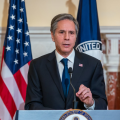Is Biden Right: Netanyahu Wants War with Hamas to Go On?

President Joe Biden’s recent remarks on Prime Minister Benjamin Netanyahu’s handling of the ongoing war against Hamas have sparked a wave of intense scrutiny and debate. In an interview with Time, Biden suggested that Netanyahu may be prolonging the conflict for political gain. This assertion, coupled with Biden’s comparison of Israel’s Gaza campaign to the U.S. invasions of Afghanistan and Iraq, marks a significant departure from the typically private criticisms exchanged between the leaders of these two allied nations.
A Fragile Coalition and Legal Troubles
Netanyahu’s critics argue that his actions are driven by self-preservation rather than the best interests of Israel. The coalition government he leads is fragile, and the threat of collapse looms large if he were to support a cease-fire. Furthermore, the ongoing corruption trial against Netanyahu adds another layer of complexity to his motives, with accusations of bribery and fraud hanging over his head.
Netanyahu’s legal troubles are far from trivial. He faces charges in three separate cases: one related to receiving gifts from foreign business leaders, a second on seeking favorable coverage from a newspaper in exchange for curbing a rival outlet’s circulation, and a third alleging bribery and fraud. These charges have not only tarnished his reputation but also fueled public outcry and protests demanding his resignation.
Echoes of Past Conflicts
Biden’s analogy to the U.S. military campaigns in Afghanistan and Iraq is particularly poignant. Those conflicts, much like Israel’s current operation in Gaza, were marked by prolonged engagement with no clear end in sight. The resulting “endless wars” drained resources and led to significant loss of life, without achieving the desired stability or peace. Biden’s warning to Israel is a reminder of the pitfalls of such military strategies and their long-term consequences.
The U.S. invasions of Afghanistan and Iraq were initially driven by clear objectives: dismantling terrorist networks and overthrowing a dictatorial regime, respectively. However, both missions evolved into protracted conflicts with shifting goals, high civilian casualties, and immense financial costs. Israel’s campaign in Gaza risks following a similar trajectory, where the initial justification gives way to a prolonged and costly engagement with no clear resolution.
The Balance of Criticism and Support
Despite his harsh critique, Biden offered some level of support to Netanyahu, acknowledging Hamas’s role in initiating the conflict and their failure to engage in cease-fire negotiations. This balanced approach underscores the complexity of the situation. While criticizing Netanyahu’s tactics, Biden also recognizes the legitimate security concerns that Israel faces and the provocations by Hamas that have escalated the conflict.
Biden’s nuanced stance is critical in maintaining the delicate balance of U.S.-Israel relations. It reflects an understanding that while Netanyahu’s leadership may be flawed, the threats posed by Hamas are real and immediate. This duality in Biden’s message aims to encourage a more strategic and humanitarian approach to the conflict, rather than an outright condemnation of Israel’s right to defend itself.
Reactions and Implications
Rebeccah Heinrichs of the Hudson Institute criticized Biden’s implication, calling it “ridiculous and harmful.” Such reactions underscore the contentious nature of the debate surrounding Netanyahu’s motives. Yet, the persistent questions about his leadership and the timing of his actions cannot be easily dismissed.
The political landscape in Israel is undeniably complex, with Netanyahu navigating not only the external threat of Hamas but also significant internal pressures. The protests against his proposed judicial reforms and the allegations of corruption have eroded his public support. In this context, the suggestion that he might be using the war to maintain his grip on power gains a certain plausibility.
The Path to Peace
Ultimately, the path to peace requires leadership that prioritizes the well-being of the nation over personal or political gain. As Biden’s comments highlight, the decisions made by leaders in times of conflict have far-reaching consequences. It is incumbent upon Netanyahu and his government to seek a resolution that ends the cycle of violence and paves the way for a sustainable peace, rather than allowing the specter of war to dictate their political survival.
Keep on Reading
A Call for Accountability
The international community, including key allies like the United States, must hold leaders accountable for their actions during conflicts. This includes scrutinizing motivations and ensuring that decisions are made in the interest of peace and stability. Netanyahu’s actions and Biden’s pointed remarks should serve as a catalyst for a broader discussion on the ethics of wartime leadership and the pursuit of political power at the expense of human lives.
Looking Forward
As the conflict continues, it is crucial for all parties involved to prioritize dialogue and negotiation over military action. The human cost of prolonged warfare is too high, and the political gains too fleeting. The future of Israel and Gaza depends on leaders willing to take bold steps towards peace, even at the risk of their own political careers. This moment calls for courageous leadership and a commitment to ending violence, not for the sake of political expediency, but for the sake of humanity.







